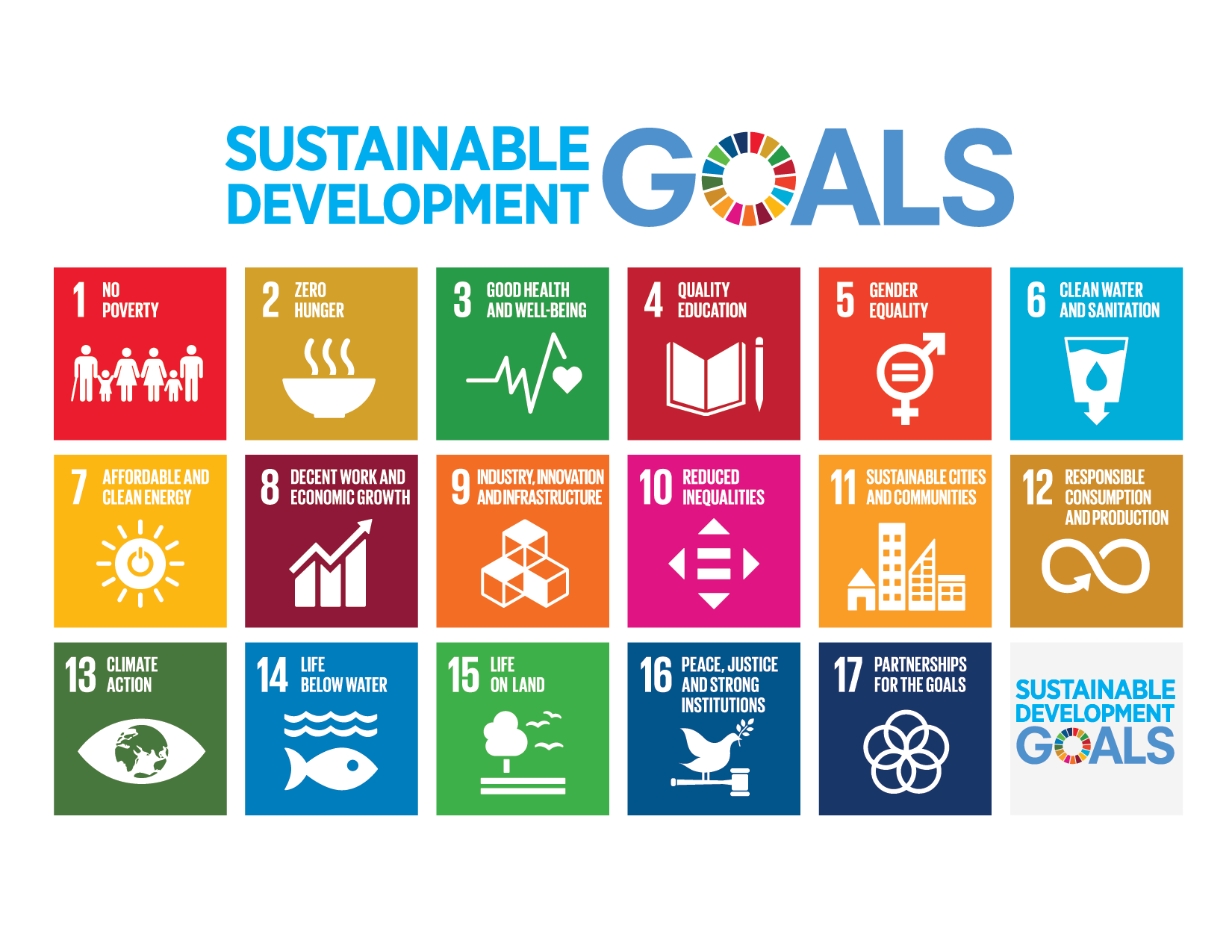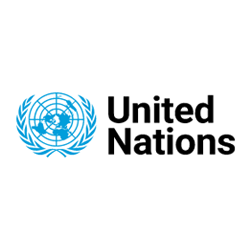The Sustainable Development Goals
The Sustainable Development Goals are the blueprint to achieve a better and more sustainable future for all. They address the global challenges we face, including poverty, inequality, climate change, environmental degradation, peace and justice.

Goal 1: No Poverty
Economic growth must be inclusive to provide sustainable jobs and promote equality.
Goal 2: Zero Hunger
The food and agriculture sector offers key solutions for development, and is central for hunger and poverty eradication.
Goal 3: Good Health and Well-Being
Ensuring healthy lives and promoting the well-being for all at all ages is essential to sustainable development.
Goal 4: Quality Education
Obtaining a quality education is the foundation to improving people’s lives and sustainable development.
Goal 5: Gender Equality
Gender equality is not only a fundamental human right, but a necessary foundation for a peaceful, prosperous and sustainable world.
Goal 6: Clean Water and Sanitation
Clean, accessible water for all is an essential part of the world we want to live in.
Goal 7: Affordable and Clean Energy
Energy is central to nearly every major challenge and opportunity.
Goal 8: Decent Work and Economic Growth
Sustainable economic growth will require societies to create the conditions that allow people to have quality jobs.
Goal 9: Industry, Innovation, and Infrastructure
Investments in infrastructure are crucial to achieving sustainable development.
Goal 10: Reduced Inequalities
To reduce inequalities, policies should be universal in principle, paying attention to the needs of disadvantaged and marginalized populations.
Goal 11: Sustainable Cities and Communities
There needs to be a future in which cities provide opportunities for all, with access to basic services, energy, housing, transportation and more.
Goal 12: Responsible Consumption and Production
Responsible Production and Consumption
Goal 13: Climate Action
Climate change is a global challenge that affects everyone, everywhere.
Goal 14: Life Below Water
Careful management of this essential global resource is a key feature of a sustainable future.
Goal 15: Life on Land
Sustainably manage forests, combat desertification, halt and reverse land degradation, halt biodiversity loss
Goal 16: Peace, Justice and Strong Institutions
Access to justice for all, and building effective, accountable institutions at all levels.
Goal 17: Partnerships
Revitalize the global partnership for sustainable development.
History
The 2030 Agenda for Sustainable Development, adopted by all United Nations Member States in 2015, provides a shared blueprint for peace and prosperity for people and the planet, now and into the future. At its heart are the 17 Sustainable Development Goals (SDGs), which are an urgent call for action by all countries – developed and developing – in a global partnership. They recognize that ending poverty and other deprivations must go hand-in-hand with strategies that improve health and education, reduce inequality, and spur economic growth – all while tackling climate change and working to preserve our oceans and forests.
The SDGs build on decades of work by countries and the UN, including the UN Department of Economic and Social Affairs
- In June 1992, at the Earth Summit in Rio de Janeiro, Brazil, more than 178 countries adopted Agenda 21, a comprehensive plan of action to build a global partnership for sustainable development to improve human lives and protect the environment.
- Member States unanimously adopted the Millennium Declaration at the Millennium Summit in September 2000 at UN Headquarters in New York. The Summit led to the elaboration of eight Millennium Development Goals (MDGs) to reduce extreme poverty by 2015.
- The Johannesburg Declaration on Sustainable Development and the Plan of Implementation, adopted at the World Summit on Sustainable Development in South Africa in 2002, reaffirmed the global community’s commitments to poverty eradication and the environment, and built on Agenda 21 and the Millennium Declaration by including more emphasis on multilateral partnerships.
- At the United Nations Conference on Sustainable Development (Rio+20) in Rio de Janeiro, Brazil, in June 2012, Member States adopted the outcome document “The Future We Want” in which they decided, inter alia, to launch a process to develop a set of SDGs to build upon the MDGs and to establish the UN High-level Political Forum on Sustainable Development. The Rio +20 outcome also contained other measures for implementing sustainable development, including mandates for future programmes of work in development financing, small island developing states and more.
- In 2013, the General Assembly set up a 30-member Open Working Group to develop a proposal on the SDGs.
- In January 2015, the General Assembly began the negotiation process on the post-2015 development agenda. The process culminated in the subsequent adoption of the 2030 Agenda for Sustainable Development, with 17 SDGs at its core, at the UN Sustainable Development Summit in September 2015.
- 2015 was a landmark year for multilateralism and international policy shaping, with the adoption of several major agreements:
- Sendai Framework for Disaster Risk Reduction (March 2015)
- Addis Ababa Action Agenda on Financing for Development (July 2015)
- Transforming our world: the 2030 Agenda for Sustainable Development with its 17 SDGs was adopted at the UN Sustainable Development Summit in New York in September 2015.
- Paris Agreement on Climate Change (December 2015)
- Now, the annual High-level Political Forum on Sustainable Development serves as the central UN platform for the follow-up and review of the SDGs.
Today, the Division for Sustainable Development Goals (DSDG) in the United Nations Department of Economic and Social Affairs (UNDESA) provides substantive support and capacity-building for the SDGs and their related thematic issues, including water, energy, climate, oceans, urbanization, transport, science and technology, the Global Sustainable Development Report (GSDR), partnerships and Small Island Developing States. DSDG plays a key role in the evaluation of UN systemwide implementation of the 2030 Agenda and on advocacy and outreach activities relating to the SDGs. In order to make the 2030 Agenda a reality, broad ownership of the SDGs must translate into a strong commitment by all stakeholders to implement the global goals. DSDG aims to help facilitate this engagement.
United Nations

PROFILE
As the world’s only truly universal global organization, the United Nations has become the foremost forum to address issues that transcend national boundaries and cannot be resolved by any one country acting alone.
To its initial goals of safeguarding peace, protecting human rights, establishing the framework for international justice and promoting economic and social progress, in the seven decades since its creation the United Nations has added on new challenges, such as AIDS, big data and climate change.
While conflict resolution and peacekeeping continue to be among its most visible efforts, the UN, along with its specialized agencies, is also engaged in a wide array of activities to improve people’s lives around the world – from disaster relief, through education and advancement of women, to peaceful uses of atomic energy.
Main Research Source
- Do you know all 17 SDGs? video(20/04/2018)
